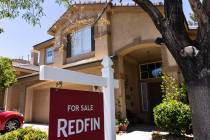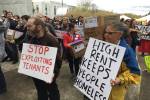Rise in Las Vegas housing prices tilts advantage to renters
The jump in Las Vegas home prices last year tilted the housing market back toward renting, online real estate service Trulia.com reported Wednesday.
Rental rates declined 0.9 percent in Las Vegas, while median home prices increased by 16.3 percent, making homeownership somewhat less affordable relative to renting, Trulia chief economist Jed Kolko said.
Nationally, rents rose 5.2 percent, slightly outpacing home price gains of 5.1 percent, even though asking price increases accelerated at year's end.
Rent increases surpassed price increases by a wide margin in Houston, Chicago, Philadelphia and Baltimore. In contrast, home prices grew much faster than rents in Phoenix, Las Vegas and parts of California. Overall, prices rose faster than rents in 17 of the 25 largest rental markets in 2012.
Asking home prices increased the most in Phoenix (26 percent), though Las Vegas and Seattle experienced the year's most dramatic price turnarounds. Both had price gains of more than 10 percent in 2012 after declines of more than 10 percent in 2011.
"It's still cheaper to buy than rent, but the gap is narrowing," Kolko said. "Whether they flip depends on lots of other factors like interest rates and the mortgage interest deduction."
Overall, 2012 marked a huge turnaround year for most local housing markets, the economist said. Prices rose in 82 of the 100 largest metros at the end of December, compared with just 12 metros in 2011.
The 2012 price turnaround was strongest in the West and Southwest, where steady job growth and vanishing inventories lifted home prices by more than 10 percent in many markets.
"The housing market enters 2013 with a running start," Kolko said. "Price gains picked up steam in 2012, starting with modest increases early in the year and accelerating in the third and fourth quarter. In 2013, rising prices will encourage more new construction and will encourage some homeowners to sell, which will help alleviate the current inventory shortage."
San Francisco-based Trulia's price and rent monitors are the earliest leading indicators of how asking prices and rents are trending nationally and locally, Kolko said. They adjust for the changing mix of listed homes and show what's really happening to asking prices and rents.
"The question of renting versus buying generally boils down to each individual's circumstances," said Brian Gordon, principal of Applied Analysis in Las Vegas. "One's expected tenure within the Las Vegas market, income stability and creditworthiness are all key factors in the decision-making process."
With median home prices in Las Vegas down about 50 percent from their peak, the opportunity to buy a home is more financially feasible for a number of households, Gordon said.
Renting also remains attractive, given some downward pricing adjustments in recent years.
Applied Analysis reported average apartment rent of $748 a month in the third quarter, down 0.5 percent from the year-ago period. Apartment rents nearly reached $900 a month in 2008.
"While rental rates did not experience the rapid pace of escalation - and decline for that matter - that the for-sale market did, both rents and sale prices are reporting increased stability as compared to the roller-coaster ride witnessed during this latest boom-bust cycle," Gordon said.
Contact reporter Hubble Smith at hsmith@reviewjournal.com or 702-383-0491.























